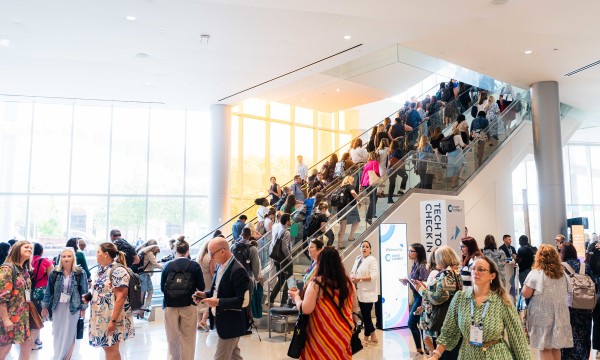
The virtual event experience became the new normal when the world was hit by the global pandemic in early 2020. When in-person events were no longer an option, event professionals had no choice but to lean into event technology more than ever before and begin partnering with new virtual event vendors.
Although navigating the virtual event experience was a rather strange and unknown territory at first, event professionals quickly realized how impactful the virtual module was. A major benefit of the virtual event experience was undoubtedly the greater audience reach, as well as the added benefits of unlimited online brand exposure and more free-form attendance.
Elements of a Successful Virtual Event Experience
So, how do you build a successful virtual event experience that captivates your attendees? This can be especially tricky if event attendees aren’t required to be on-camera – because who's to say they aren’t multi-tasking and half listening to the content being presented to them?
Creating an immersive virtual event experience comes with some challenges. Nothing can replace the in-person connections created during social opportunities such as networking meals or happy hours; however, virtual facetime is still important in today’s digital age. There are so many ways to get creative to achieve true connections through a screen - especially when you're working with the right partners.
The event experience refers to how attendees engage with all the elements that go into an event, including registration, ticketing, event content, speakers, moderators, and so much more. As you consider how to increase engagement and build a successful virtual experience, think about the attendee experience through these lenses:
1. Technical/Platform Experience
- Registration: Registration sets the tone for an event. This process should be as seamless and intuitive as possible, and attendees should receive immediate confirmation details upon registration with clear next steps.
- Email promotions and notifications: Less is more when it comes to email promotions. Try to limit your emails to only essential updates about the upcoming event and targeted emails related to individual attendees’ interests. Text notifications can also be helpful reminders as the event date nears.
- Event calendar & appointment management: Whether attendees are joining the event in person or virtually, having the right people makes all the difference. With the ability to add sessions and activities to their event calendars, as well as schedule appointments, attendees can take their event experience in their own hands, facilitating meetings with other attendees, employees, sponsors, and exhibitors; make more meaningful connections; and foster deeper relationships.
- Accessing content: Life happens, and things come up. If your attendees are double booked or unable to attend your event, having the virtual event experience recorded is important so that your attendees can watch it later on demand at their convenience. Offering on-demand content also extends the engagement cycle, allows for an even greater audience reach, and encourages attendees to keep tabs on your next event.
2. Opportunities for Engagement
There are several different forms of engagement that planners try to achieve. Any form of engagement is considered a win, however trying to hit all levels of engagement is really the ultimate goal.
Brand Engagement
Brand engagement is critical because you want your company mission and values to resonate with your attendees, and you want to leave a lasting impression. “You know about that annual event hosted by (company name)? You need to attend it next year; they never miss a beat about (XYZ)!”
Sponsor/Exhibitor Engagement
The same importance should be placed on achieving attendee engagement with your sponsor and exhibitors, as your event must help them meet their goals. Whether those goals include making sales, getting their messaging out to your attendees, or otherwise, the goal is to tell a story together in a powerful collaboration.
Peer Engagement
Attendees play a huge role in making an event great – especially for other attendees. Every interaction between attendees is an opportunity to network and foster lasting relationships – and your event makes those interactions possible.
Content Engagement
If you want to present content that captivates your attendees, you’re talking content engagement. How do you achieve that engagement? By choosing content themes that appeal to your attendees, however diverse they may be, and by crafting engaging ways to deliver that content and extend engagement.
Here are just a few ways to engage your attendees on every level, including brand, sponsor/exhibitor, peer, and content:
- Live and on-demand sessions
- Networking opportunities
- Virtual exhibitor booths
- Breakout rooms for focused discussions
- Training and certifications
- Individual appointments
- Games and quizzes
- Surveys and live polling
Not sure where to start? The vendors you partner with can make or break your event – and provide some pretty great ideas for maximizing attendee engagement.
3. Content Delivery Experience
Once you’ve determined the ways in which you want to engage your attendees, you’ll need to determine the methods you’ll use to deliver content to your virtual audience. There are a few key considerations you’ll need to make here.
- Live or Pre-Recorded Content: When hosting a virtual event, you can likely pre-record a large portion of your content. Not all content needs to be “live” when there’s no in-person audience, and pre-recording can save you time and resources when producing content. That said, there may still be a good reason to host truly live content during your event. Attendees love to see things happen in real-time – the raw footage. The live stream approach creates a more authentic virtual event experience.
- A/V equipment/staff needed to engage: You need the right A/V team and equipment to deliver engaging, professional-grade content. A/V equipment ranges from speakers, monitors, microphones, and live broadcasting and web streaming systems – anything that projects or generates audio and visual effects. A/V technology and expertise are essential for the virtual event experience, so be sure you’re working with vendors you can trust.
- Session types (on-demand, live stream): Offering on-demand sessions from your event is highly recommended, as it gives attendees the option to watch at their convenience. This flexibility allows for a greater audience reach (including attendees who might be unavailable when your event is “live”) and more time for your attendees to digest the content. On the flip side, live-streamed content is always exciting and can be made available only to certain registration types or offered as a “perk” to attendees who are able to participate in your event while it’s running.
Virtual and Hybrid Events – What's the Difference?
According to a recent industry survey, 58% of planners said they expect to plan more in-person events in 2023 vs. 2022. However, we’re still not seeing 2019 in-person event numbers, which suggests virtual events are here to stay.
Even so, with 64% of marketers saying their virtual events are not effective, many organizations may find the perfect solution in the hybrid event model. Hybrid events deliver one event with two unique event experiences – one for in-person attendees and one for virtual attendees. The hybrid event module can be considered the ‘happy medium’ of the event formats – marrying the in-person and virtual experience with the help of evolving event technology.
The in-person component will always be apparent during a hybrid event, which is why it’s so important to craft two experiences for a single event. It’s not enough to let virtual attendees miss out on in-person activities and vice versa – no one wants to have “FOMO” while attending your event. All attendees, whether in-person or virtual, should feel like your event experiences are built with them in mind, from networking opportunities to real-time entertainment.
Crafting Successful Virtual Event Experiences for Hybrid Events
When you go hybrid, it’s important to remember that the in-person experience affects the virtual, and the virtual also affects the in-person experience. Some in-person programming might no longer make sense or may need to be altered to include virtual attendees.
Take networking events: do you want your in-person and virtual attendees to be able to connect? If so, how can you make that happen without negatively affecting either audience?
In a Cvent podcast focused on the Essentials for Hybrid Events, it’s mentioned that staying flexible and being open to the creative aspect of meeting planning is critical now more than ever. Building out the two separate event experiences of virtual and in-person to find the perfect Hybrid blend requires a dedicated team and the right vendors to help you divide and conquer and focus on both unique experiences.
All things considered, Hybrid events are the new frontier in the events industry. The convenience of these events, paired with constant advances in event technology, has forever changed how events are planned and hosted.
Finding the Right Virtual Event Vendors
Whether you're going entirely virtual or creating a hybrid event, the event vendors you partner with have a huge impact on the success of your event. From A/V vendors to gaming solutions, think carefully about how your vendors impact your attendees' virtual event experience.
Need inspiration or guidance on finding the perfect vendors for your event? Browse the Cvent vendor marketplace, and check out more ways your vendor partners can enhance your events, including:
- Wow your attendees with event engagement ideas that your vendors can help bring to life
- Let a destination management company help you make the most of your event location
- Get on-site event support that makes in-person events a breeze








